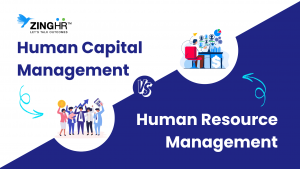We have a lot of automation in HR using HR technologies like AI, ML, Bots etc which has a fair amount of success. But automation alone is not fully enough to look at business outcomes especially in today’s world. So ‘Outcome + Automation = Outcomation’.
Moderator

Mr. Rabindra Srikantan
Convenor – CII Karnataka Technology & Innovation Panel 2020.
Managing Director – ASM Technologies Ltd
Speakers

Mr. Vasant Sanzgiri
Group Head of Human Resources – Shapoorji Pallonji Group

Mr. Ashish Kakkar
CHRO – ICICI Home Finance Company Limited

Mr. Prasad Rajappan
CEO and Founder – ZingHR

Mr. Prasad Rajappan
CEO and Founder – ZingHR
The world has been talking about automation in HR using AI, Bots, Robotic Interviews, and so on. We at ZingHR – Best HR Software Solution believe in Outcomaton, and I believe Covid has given an opportunity for the HRs to become business partners and drive Business Outcomes. There have been multiple discussions on increase in productivity in current times and making Work From Home forever. The general opinion of most senior management personnel is, there has been a lot of collaboration, but we are missing human touch, and how do we continue with business continuity.
ZingHR has coined the term ‘Outcomation’ which means, focusing on Business Outcomes through HR Innovations. We often mix up between, Activity and Productivity, Value-added and Non-Value Added, Purpose and Means.
Covid has affected our way of working in multiple ways apart from binding us all at home. Team performance is given higher priority as compared to individual performance. Covid has also been a great leveler. It’s an opportunity for everyone who believes in agility and adaptability. When ZingHR launched Work From Home HR software solutions, we were flooded with calls from many big names across the industry. We realized that was because we were agile and adaptive in our approach.
Now coming to outcomes, Covid has made us focus on Business Continuity and Customer Retention & Growth. This becomes the purpose and the means is How do I improve Productivity? How do I upgrade my skills? How do I get transparency built in? How do I show concern for my people? Most importantly, how do I convert Fixed Cost to Variable Cost? As managers, what can we do to achieve things? How do we face realities of loss in revenue with costs remaining the same?
Hence it’s time to focus on real outcomes, and moving out of the euphoria of working from home.
Mr. Vasant Sanzgiri
Group Head of Human Resources – Shapoorji Pallonji Group
One of the very important points in Mr. Prasad’s notes was related to Activity and Productivity. That makes the question, what is the role of automation in the way we work? Was automation a means to improve the work conditions and activities that were being done or was it a means to improve productivity? I think they both vary, as one has got to do with efficiency relating to humans and other with conversion of the level of work that has to be done by man vs. the machine.
Over the time, many activities of HR operations were considered to be mundane and automation was introduced. It had its pros and cons. Somewhere along the line, in this whole euphoria, of getting into automation, we forgot the aspect of measures to improve efficiencies.
I look at automation as bringing in efficiencies and not removing humans. So the starting point of any of this change is what is the outcome that you really want? If your vision on the outcome is clear, you take the right steps. As for automation, it’s not a question of whether it’s a boon or bane; it’s more got to do with the value that we are bringing in for that transaction or experience to the employee. Therefore what needs are getting satisfied by automation needs to be answered. There are many advantages to it, but if you are going for it only because of trends then you are missing it. Like in customer facing organizations, how do you say, machines would be dealing with them. So there are paradoxes that exist and you grapple with; when you talk about automation, and so the focus needs to be on Outcomes that we want.
At the end of the day businesses exist to create value for all shareholders and stakeholders.


Mr. Ashish Kakkar
CHRO – ICICI Home Finance Company Limited
Let me give a broader dimension on what Vasant touched upon. Human beings are wired to keep looking at things to improve. The whole purpose of automation or automating factories was largely to improve productivity and multiply things by 10. This happened in industry till 1900. Things changed after that, they moved from there to simplification. From the mid 1900’s to 1960’s, the world started looking at simplification. Today’s workforce started asking, why am I supposed to do what I’m doing, and that prompted us business practitioners in identifying why things had to be done? And I think that’s where this whole concept of Outcomation is important.
Until and unless we write down why we need to do what we need to do, doing what and how is irrelevant. We need to have a clear vision on what we want out of it. Today for any organization, having an online HRMS tool is imperative, it’s not a luxury. Today’s workforce demands it.
We need to be conscious of 2 things in today’s world, Artificial Intelligence in HR and Natural Stupidity.
Questions
What are the current challenges in the industry?

One of the challenges especially when dealing with automation is, what is its need; and does it tie up to a business goal. Business goals are not limited to reducing costs. There was a period when, largely automation was towards reducing cost, now the world is changing where automation is required to improve revenue.
Secondly, today automation is also asking for it to remove human to human touch. As humans we thrive on human interaction, without that it’s difficult to get the best out of the person. Automation is no longer an initiative, today it’s horizontal rather than vertical.
Lastly, people are now getting frustrated with too much automation. Human intelligence is getting covered by the chatbots or analytics. That is taking over the human gut. We need to be cautious about automation telling you things, we cannot have human gut being taken over. Automation is not the ultimate goal.

Life will be definitely different once we get back to offices, and what we had assumed to be impossible is going to be the norm; especially in companies with traditional yet successful approaches. So the biggest challenge is going to be, making a change to the mindset in the way we work, with some technology and some human interface.
I’m a firm believer that some functions cannot be entirely replaced with automation. So if efficiency is something you’re aiming for, you need to see what value the automation will bring, to both customers as well as internal stakeholders.

I think the current challenges are Predictability and Constraints. We are not able to predict what the future is. Whatever future we were envisaging earlier, just passed away yesterday! There are a lot of constraints. The question is how do I stay with the constraints? Economy will grow from cities to rural areas because of the constraints. We can convert the challenges into opportunities
How much justified is it to go for a salary cut after Covid?

In today’s world, the biggest challenge is going to be managing fixed costs. It is made to ensure that you can sustain in his environment which is competitive to a different level. The days have gone where you had advantages of things like your brand. Everyone is at the same level now in terms of challenges and expectations to deliver a particular service. Compensation reduction therefore should be part of a bigger initiative for any organization, to manage its fixed costs. Businesses are mandated to negotiate with their vendors, office rentals and landlords. So everyone is trying their best to reduce fixed costs, and compensation is a part of this. So HR needs to see this as a part of making the business more robust, so tomorrow when the opportunities open; I will be there as a part of the organization to contribute, and when I contribute, I will be rewarded as well. So when the PM says, ’Jaan hai to Jahan hai ’, it’s a fact. If we do not make small sacrifices, tomorrow when the opportunity is there we won’t be there to share the spoils. Salary cuts are painful to everybody, but if there’s a long term perspective, we should be happy that the organization is having us as a part of them and giving us an opportunity to turn around the business.

Whether Covid or no Covid, every organization has to keep evaluating its cost structure. For every 10 organizations that get setup in a year, there are also 2 organizations that close down. So organizations have to keep re-evaluating their cost structures. The point is, is it done with transparency? And that’s where the business heads along with HR partners will really have to put out a very transparent process to all the stakeholders. If we take any one cost element in isolation, it will lead to victimize. The definition of leader has changed. This is the time for the character of individual and organization to come to the fore. This is the time to show your true values. So if it’s a question of survival, we all will need to do it, but in a very transparent way, where employees need to feel as partners and not victims. Mr. Prasad Rajappan: Covid has happened to the entire universe and we all are part of that. So now you need to be a party to that change process. Salary cut is always heartburn, but if there is transparency it will be less. And salary cuts are always better than layoffs. You always need to strike a balance between the two.
What would be the roadmap of HR on upcoming days, in current situation and post covid?

According to him, HR will become a trait niche manager. Every manager needs to have HR characteristics. If you’re part of the HR fraternity, it’s time to take center stage and take charge. Most HR people are successful who think of the business.

In many conferences it is said, HR needs to become a business partner. I think this is a good time to put that statement to test. How do you balance the sensitivity to the softer aspects as much as being firm? It’s like finding the balance between your heart and mind, and HR is in that sweet spot to bring that balance to the business.
What broad steps companies should take to improve the post Covid situation?

One of the first steps is ensuring your employees that you’re going to give them a safe working environment. To give comfort on the future which is right now uncertain would be unfair. So we need to take one step at a time. First is ensuring offices are a safe place, people not risking themselves while coming to work or delivering their work. Secondly we will have to wait and watch, rather than giving a very prescriptive answer for the next 6 months. How the next 6-8 weeks go in India, will help to draft those answers.

Emphasized that it is going to be important how the last 2 months were used by the organization. This situation has given everyone time to take a step back and look at the business in a calm and clear way. If this has not happened, and we are waiting for the world to open again, then we will end up going in the same circle of madness that was happening before. However, if you have looked at your business from a different level, than there are chances that you have identified certain building blocks. Identifying the gaps and working at solutions to fulfilling these gaps is important. You many need to tweak the fundamentals and bring in some technology aspects, but it needs to be done. So when everything opens up you’re ready and turn out to be a much stronger organization.

Made a valid point that We need to be agile and resilient. Apart from high level strategy for resuming work, we have technology tools too like HR Software with Facial Recognition technology or QR based attendance software rather than Biometric, linking of medical policies and so on. They all will show your care towards your employees.
Which areas of HR should be in focus more in terms of needing a change in policy/benefit/practise?

Answered this question, when you are part of a test team, what is more important? Batting, Balling or Fielding? In your organization, you need to figure out, which area are your weak and strong seats; and start building on your strengths. That is the mantra we follow, it helps make your weaknesses relatively insignificant. That could mean policies or technology in place, safety in the environment.

Had a question which he asked to Vasant and Ashish, do you think Covid 19 is going to make less control policies and more empathy policies? There are many discussions on making policies more employee friendly, do you see that happening?

Answered this stating One thing that I have observed in this Work from Home phase is, employees have realized working is about outcomes. So as long as you are delivering your outcomes, the number of hours or location does not matter. This is a change in mindset that I can see happening gradually.

Felt what differentiates a great organization from a good one is having empathetic policies. Now the organizations may want to have empathetic policies but will be constrained by budgets, because all these policies will come with a cost. Like insurance for instance, today I might want to widen the scope, but I will not have money in my pockets. My second take is, controlled policies have to go away. I think we need to start thinking of the 3% who will break the policy rather than the 97% who will follow it. The policies should have less use of Don’t and Not to do and more of Do and what you’re supposed to do
How can salary cuts help in reducing your fixed costs?

When you talk about CTC, it includes incentives, but incentives are built upon performance. There are companies that are accepting that 2019 has been a decent year and performers need to be rewarded. But as of 2020, 3 months have passed and we don’t have clarity for the next 3 months. In such a situation, how do we materialize any incentives. There are companies that have reduced their pool by 50%. The reduction needs to be done on salaries; it also depends on company cost structure. Some of them have 50% cost structure towards employees, some have only 5%. So 10% reduction in a company with 50% employee costs is a significant saving, and 10% in a company with 5% costs is a symbolic saving.
What are possibilities of future hiring and increments to employees going forward?

There will be huge re-evaluation on business, restructuring of profit and loss statements of companies. So to answer whether there will be hiring or increment in future is difficult. It will vary in different industries. Like healthcare or online platforms will not have a huge impact. So to answer this question on a general level will be unfair. Apart from this, it’s important to accept the reality, given the situation; we need to reset our targets and aspirations. You need to focus on staying in the game rather than succeeding in it.

There might be hiring in sectors like retail or manufacturing, because their employees like part time workers have moved back to their villages. Hiring will happen in phases, and multi-skilling will be essential; as companies will look at operating frugally. As for the question on education, that sector is up for a big change. With the government announcing that education till Higher Secondary can be completed online, an education revolution is on its way.

I endorse everything that’s been said. The takeout is, if you’re an employee; ensure you’re constantly upgrading your skills. If you’re an HR, please communicate the message to your people. If you’re a student, make sure your education makes you employable, not just your certificate but also your skills.
We as an industry should have some ready-made handbooks to deal with trade unions post COVID scenarios. What is your stake on this?

Since I have worked in the Industrial Relations sector, my short answer to this is, if you view trade unions as your partners you can really make changes. Trade unions happen because of policies of the organization. If you have employee centric, empathetic policies, this will not completely change, because humans are wired to interact together. I don’t have a handbook answer, but unions will also change their view going forward.

With an analogy of how things change between test cricket and T 50, and if you say I will play test cricket the same way I played T 50 and vice versa, then you are in the wrong business. Rules will have to be framed with a uniqueness that will help you with Work from Home, and in the absence of any framework, it’s like free for all. We have calls at 8 PM which never happens in normal office life. So we need to lay groundwork that makes sure Work from Home does not become a burden.

New rules will come in place, and the HR practitioners along with CEOs will have to sit and define these rules. There are no best practices right now; what works for Google may not work for you. Things will clear up as time goes by. In the interim, it’s the business leaders who will make the rules.
View of the increase of moratorium period impact on Business and how HR can roll in this situation?

The HR team needs to organize training for all employees on Finance Management. We have been receiving this question on the moratorium period from employees as well as customers. Maybe you can use them to clear your credit card bills or high interest bills. Also the RBI has said moratorium for another 3 months, so 6 months is a good time to plan your finances.
Kind of roles and processes will be relooked or changed or impacted and how HR Leaders are positioned to handle them?

Mentioned that multi-skilling will be essential so you’re not limited to the box of say HR Operations or Recruitment. Now it’s the time to be a generalist, who is good in every aspect.
Will Outcomation also put pressure on organizations to relook at its existing internal processes and Organization structures? What are the major shifts that can be anticipated?

In his opinion, it’s not pressure but an opportunity. When we conducted Lean HR workshops pre-Covid, there was an observation of around non value 80% activities. So now it’s an opportunity and imperative for us to focus on this.

I agree this is an imperative where HR has a role to play in working on the cultural dimension of the change; because that will naturally be receiving unprecedented resistance as everybody is under the pressure to perform. So it’s important that HR is the holder of that cultural dimension in bringing about that change.

If the designed outcome is that there has to be changes in the org structure and roles & responsibilities have to change then they will have to change. Otherwise the whole purpose of automation is lost. So let’s not fear it. This whole process is not only about cost deferment but also revenue increase, if we can make this work, then we don’t need to worry about AI driven or non human interface processes.

There are many cross-functional agile teams that are being formed, which might mean that the traditional hierarchy might deviate to such small member teams. This is the best time to up-skill and be prepared for the future. We at ZingHR (Global HCM Platform) are running our own academy for HR professionals, to train on how to handle this scenario, conduct service, how to handle AI and so on.
How do we measure the performance or productivity of people working from home?

I think it’s all about setting expectations of certain deliverables. It also depends on the nature of your job. Like in our case, people need to be on construction sites, they cannot work from home. But for people with office jobs, the deliverables should be the criteria and not how many hours did they login.
From an HR perspective, how to control employees’ emotions on downsizing manpower and other benefits cut?

Human beings are prone to having emotions and they need to be expressed. Good news is human beings are also intelligent. After the initial anger and remorse, objectivity will settle in and people will calm down.

I have also been at the receiving end of the bad news, I reacted with emotions and over a period of time you get aligned with it. When dealing with humans, you have to let those emotions come out. Trying to control them is like waiting for a nuclear reaction.


In the spur of the moment it’s going to be a problem, but later on when the person will realize that it was a rational decision with no other option, it will settle down. You can’t prevent certain things from happening.
RBI has increased the moratorium period, in this case what should be the role of HR, as it’s going to have a huge impact on business?

My understanding is, there is not going to be no interest, it’s just going to be deferred. The meter is still on, it’s just that the person’s ability to not pay, and give him an opportunity to be not a defaulter. But the fact that he has to pay the delayed interest is not going away.

Like people who have taken loans from you have an option of moratorium, you as an MFI also have an option to ask for a moratorium from your lenders. So it’s not limited to one side of the equation. There will be an impact as the cash flow will be limited, but organizations will have to find a balance depending on their own internal context. Given the situation it was expected that the moratorium would be extended and the organizations should have prepared themselves for it.




